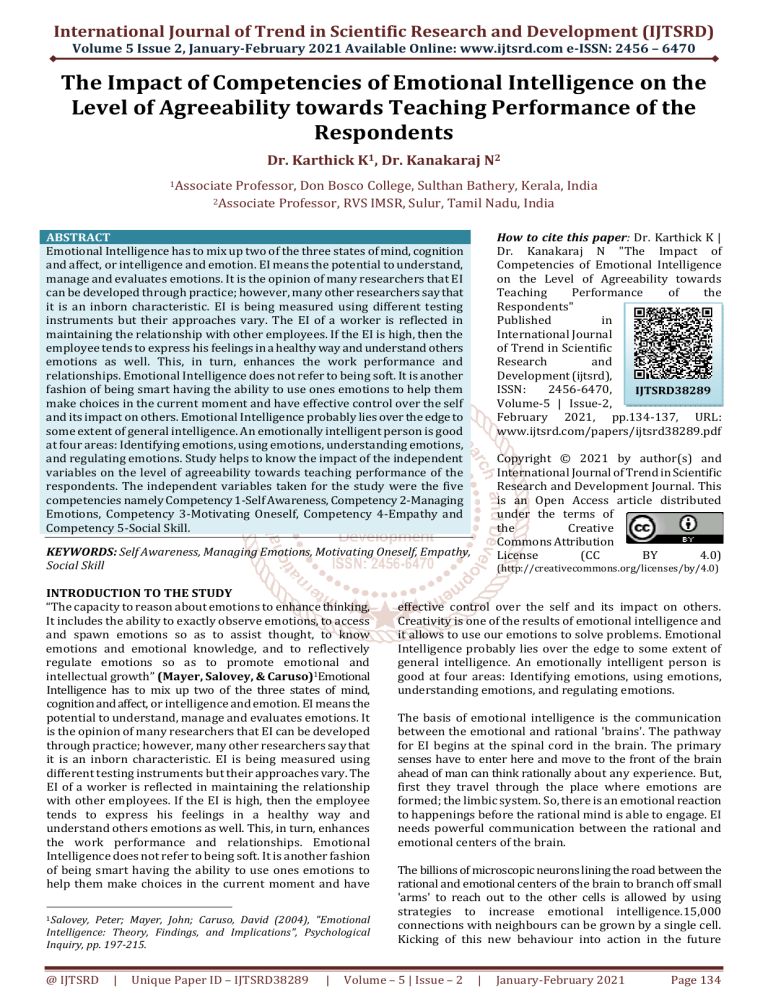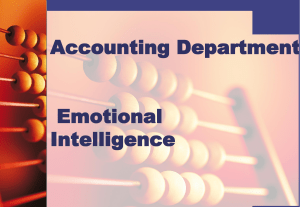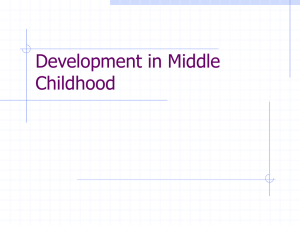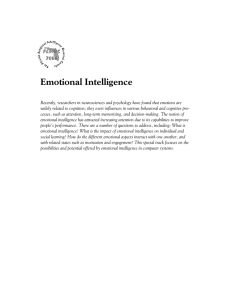
International Journal of Trend in Scientific Research and Development (IJTSRD)
Volume 5 Issue 2, January-February 2021 Available Online: www.ijtsrd.com e-ISSN: 2456 – 6470
The Impact of Competencies of Emotional Intelligence on the
Level of Agreeability towards Teaching Performance of the
Respondents
Dr. Karthick K1, Dr. Kanakaraj N2
1Associate
Professor, Don Bosco College, Sulthan Bathery, Kerala, India
Professor, RVS IMSR, Sulur, Tamil Nadu, India
2Associate
How to cite this paper: Dr. Karthick K |
Dr. Kanakaraj N "The Impact of
Competencies of Emotional Intelligence
on the Level of Agreeability towards
Teaching
Performance
of
the
Respondents"
Published
in
International Journal
of Trend in Scientific
Research
and
Development (ijtsrd),
ISSN:
2456-6470,
IJTSRD38289
Volume-5 | Issue-2,
February 2021, pp.134-137, URL:
www.ijtsrd.com/papers/ijtsrd38289.pdf
ABSTRACT
Emotional Intelligence has to mix up two of the three states of mind, cognition
and affect, or intelligence and emotion. EI means the potential to understand,
manage and evaluates emotions. It is the opinion of many researchers that EI
can be developed through practice; however, many other researchers say that
it is an inborn characteristic. EI is being measured using different testing
instruments but their approaches vary. The EI of a worker is reflected in
maintaining the relationship with other employees. If the EI is high, then the
employee tends to express his feelings in a healthy way and understand others
emotions as well. This, in turn, enhances the work performance and
relationships. Emotional Intelligence does not refer to being soft. It is another
fashion of being smart having the ability to use ones emotions to help them
make choices in the current moment and have effective control over the self
and its impact on others. Emotional Intelligence probably lies over the edge to
some extent of general intelligence. An emotionally intelligent person is good
at four areas: Identifying emotions, using emotions, understanding emotions,
and regulating emotions. Study helps to know the impact of the independent
variables on the level of agreeability towards teaching performance of the
respondents. The independent variables taken for the study were the five
competencies namely Competency 1-Self Awareness, Competency 2-Managing
Emotions, Competency 3-Motivating Oneself, Competency 4-Empathy and
Competency 5-Social Skill.
Copyright © 2021 by author(s) and
International Journal of Trend in Scientific
Research and Development Journal. This
is an Open Access article distributed
under the terms of
the
Creative
Commons Attribution
License
(CC
BY
4.0)
KEYWORDS: Self Awareness, Managing Emotions, Motivating Oneself, Empathy,
Social Skill
INTRODUCTION TO THE STUDY
“The capacity to reason about emotions to enhance thinking,
It includes the ability to exactly observe emotions, to access
and spawn emotions so as to assist thought, to know
emotions and emotional knowledge, and to reflectively
regulate emotions so as to promote emotional and
intellectual growth” (Mayer, Salovey, & Caruso)1Emotional
Intelligence has to mix up two of the three states of mind,
cognition and affect, or intelligence and emotion. EI means the
potential to understand, manage and evaluates emotions. It
is the opinion of many researchers that EI can be developed
through practice; however, many other researchers say that
it is an inborn characteristic. EI is being measured using
different testing instruments but their approaches vary. The
EI of a worker is reflected in maintaining the relationship
with other employees. If the EI is high, then the employee
tends to express his feelings in a healthy way and
understand others emotions as well. This, in turn, enhances
the work performance and relationships. Emotional
Intelligence does not refer to being soft. It is another fashion
of being smart having the ability to use ones emotions to
help them make choices in the current moment and have
1Salovey, Peter; Mayer, John; Caruso, David (2004), "Emotional
Intelligence: Theory, Findings, and Implications", Psychological
Inquiry, pp. 197-215.
@ IJTSRD
|
Unique Paper ID – IJTSRD38289
|
(http://creativecommons.org/licenses/by/4.0)
effective control over the self and its impact on others.
Creativity is one of the results of emotional intelligence and
it allows to use our emotions to solve problems. Emotional
Intelligence probably lies over the edge to some extent of
general intelligence. An emotionally intelligent person is
good at four areas: Identifying emotions, using emotions,
understanding emotions, and regulating emotions.
The basis of emotional intelligence is the communication
between the emotional and rational 'brains'. The pathway
for EI begins at the spinal cord in the brain. The primary
senses have to enter here and move to the front of the brain
ahead of man can think rationally about any experience. But,
first they travel through the place where emotions are
formed; the limbic system. So, there is an emotional reaction
to happenings before the rational mind is able to engage. EI
needs powerful communication between the rational and
emotional centers of the brain.
The billions of microscopic neurons lining the road between the
rational and emotional centers of the brain to branch off small
'arms' to reach out to the other cells is allowed by using
strategies to increase emotional intelligence.15,000
connections with neighbours can be grown by a single cell.
Kicking of this new behaviour into action in the future
Volume – 5 | Issue – 2
|
January-February 2021
Page 134
International Journal of Trend in Scientific Research and Development (IJTSRD) @ www.ijtsrd.com eISSN: 2456-6470
becomes easier by the chain reaction of growth. Training
brain using new EI strategies will help you to convert EI
behaviours into habits.
Understanding the five categories of emotional
intelligence (EI)
1. Self Awareness
It is one's ability to identify an emotion as it happens. Tuning
in to your true feelings helps self awareness. If you evaluate
your feeling and emotions, you will manage them. The
primary elements of self awareness are:
Emotional awareness: It is your ability to recognize
your own emotions, feelings and their impacts.
Self-confidence: It is the confirmed feeling about your
self-worth and ability.
2. Self- Regulation
Self control is limited when you experience emotions. You
can, however, control your emotions using a number of
techniques and alleviate negative emotions like anxiety,
depression or anger. A few of these techniques include
taking a long walk, meditation or prayer and recasting a
situation in a more positive light. Self regulation involves
Self control that manages disruptive impulses
Trustworthiness that maintains one's honesty and
integrity standards
Conscientiousness that takes responsibility for own
performance
Adaptability that handles change with flexibility
Innovation that is open to new ideas
3. Motivation
Clear goals and a positive frame of mind are necessary to
motivate an individual for any achievement. Any inclination
towards positive or negative attitude may be present; but
you can practice to think more positively with effort. If you
get negative thoughts as they occur, they can still be reframed
in to positive terms- which will support your endeavours to
achieve you goals. Motivation constitutes of
Achievement drive- it is the stable striving to grow to a
standard of excellence
Commitment- it is the ability to align with the goals of
the group or organization
Initiation- it is you ability to be the forerunner when
opportunities are available
Optimism- it is the positive frame of mind that helps to
pursue a goal constantly
4. Empathy
It becomes necessary for an individual to have the potential to
recognize how people feel to attain success in life and career. You
can better control the signals you send, if you are skillful at
discerning the feeling behind others' signals. An empathetic
person is good at:
Service orientation: Expecting, identifying and meeting
clients' requirements
Developing other: Finding out what others need to
develop and helping bolstering their abilities
Leveraging diversity: Cultivating opportunities
through diverse society
Political awareness: Analysing a group's emotional
flow and power relationships
Understanding other: Discerning the emotions behind
the needs and wants of others
@ IJTSRD
|
Unique Paper ID – IJTSRD38289
|
5. Social Skills
The success of your life and career is tantamount to the
development of good interpersonal skills. We have
instantaneous access to technical knowledge in today's
incessantly connected world. Possessing 'people skills' is
important as you need to have high EQ to better understand,
empathize and negotiate with others in a global economy.
The following are some useful skills.
Influencing which is wielding impactful persuasion
tactics
Communicating which is important to send clear
messages
Leadership to inspire and guide groups and people
Being a change catalyst to initiate and manage change
Conflict managing is to understand, negotiate and
resolve disagreements
Building bond is to nurture instrumental relationships
Collaborating and cooperating skills to work with others
toward shared goals
Team working and wiring capabilities to create synergy in
pursuing common goals.
REVIEW OF LITERATURE
Jamilya et al (2014), in her article has examined the extent
to which the competence-based approach was implemented
in the education system of Kazakhstan through of mixed
methods research approach. The design of a study on emotional
intelligence and teaching competencies is outlined by this
paper. The combination of quantitative data (Emotional
Intelligence and Teaching Competencies measurements) and
qualitative data (Emotional Intelligence and Teaching
Competencies qualities, descriptions) issues improved
understanding of a research question. The embedded mixed
methods design was employed to explore to what extent the
emotional intelligence subscales were correlated with the
teaching competencies.
DhilsathBegam (2014), in her study has examined the level
of Emotional Intelligence among teachers working in the
private institutions in Erode District. It also stresses on the
significance of Emotional Intelligence in personal, academic
and career success. Descriptive research design was used
and proportionate stratified random sampling was adopted
for study. Sampling fraction of 25% was taken to categorize
the population into a homogeneous subgroup. The study
found the phenomena related to Emotional Intelligence
among private institutions teachers in Erode District.
Demographic factors influencing on Emotional Intelligence
were also spotted and reported using descriptive statistics.
Result indicated that the private educational institutions
teachers in Erode District had fairly high level of Emotional
Intelligence.
Mehdi Sarkosh and Abbas Ali Rezaee (2014), in their
study investigated the association among university
teachers. 105 university teachers were made to participate
in the present study. The participants were needed to finish
the “Teachers’ Sense of Efficacy Scale” and the “Emotional
Intelligence Questionnaire”. Correlation and regression
analysis were conducted on the data. The outcome of data
analysis showed that there was a strong positive relationship
between EI and self-efficacy beliefs. Furthermore, the study
identified that among the 15 components of EI, three
subscales of Flexibility, Optimism and Interpersonal
Relationship were positive predictors of Efficacy beliefs.
Volume – 5 | Issue – 2
|
January-February 2021
Page 135
International Journal of Trend in Scientific Research and Development (IJTSRD) @ www.ijtsrd.com eISSN: 2456-6470
The sample constituted of 100 teachers. Data collection was
done by the emotional intelligence scale developed and
standardized by Hyde and Pethe (2001).data analysis was
carried out using independent t-test. The result showed that
emotional intelligence was not dependent of sex, type of
school, age and length of experience.
TurkayNuriTok,
SükranTok
and
SevdaDoganDolapçioglu (2014), in their study examined if
there was significant relationship between classroom
teachers’ EI and their classroom management approaches,
and if EI significantly predicted classroom management
approaches. Correlational model was adopted in the study.
The sample of the study had 233 primary school teachers
working at 22 primary schools in Hatay city’s Central
Province Antakya (Turkey). The data was collected by
administering the “TheEmotional Intelligence Scale”, and the
“The Classroom Management Inventory”. The result showed
that EI was positive predictor of teacher-centered classroom
management with weak predictive power. There was a lowlevel, hopeful, and significant relationship between primary
school teachers’ EI levels and teacher-centered classroom
education approach.
OBJECTIVES OF THE STUDY
To know the impact of competencies of emotional
intelligence on the level of agreeability towards teaching
performance of the respondents
RESEARCH METHODOLOGY
Area of the Study - Coimbatore District.
Sources of Information - Primary Data through
questionnaire.
Sample Size - 500 respondents.
Sampling Technique – Random sampling method.
Tools and Techniques – Multiple Regression Analysis.
NishaMaharana (2013), in their study tried to study the
emotional intelligence of the higher secondary school
teachers. The stratified random sampling method was used.
ANALYSIS AND INTERPRETATION
Regression analysis was carried out to know the impact of the independent variables on the level of agreeability towards
teaching performance of the respondents. The independent variables taken for the study were the five competencies namely
Competency 1-Self Awareness, Competency 2-Managing Emotions, Competency 3-Motivating Oneself, Competency 4-Empathy
and Competency 5-SocialSkill.
The following table (a), (b) and (c) highlights the results
The following hypothesis was framed to find the significant relationship/impact of the independent variables over the
dependent variable i.e., level of agreeability towards teaching performance
Hypothesis: “There is no significant relationship/impact of the independent variables over the level of agreeability towards
teaching performance of the respondents”.
Model
R
Table (a) Model Summary- Regression Analysis
R Square
Adjusted R Square
Std. Error of the Estimate
1
.704a
.695
.690
8.70612
a. Predictors: (Constant), , Competency 1- Self Awareness, Competency 2- Managing Emotions,
Competency 3- Motivating Oneself, , Competency 4- Empathy, Competency 5- Social Skill
From the above table (a), it was clear that with the R2 value of 0.695 the independent variables namely Competency 1-Self
Awareness, Competency 2-Managing Emotions, Competency 3-Motivating Oneself, Competency 4-Empathy and Competency 5Social Skill had an overall impact of 69.5% over the dependent variable ie., level of agreeability towards teaching performance
of the respondents
Table (b) ANOVA
Df
Mean Square
Model
Sum of Squares
Regression
36708.885
5
7341.777
Residual
37443.457
494
75.796
F
Sig.
96.862
.000a
Total
74152.342
499
a. Predictors: (Constant), , Competency 1- Self Awareness, Competency 2- Managing Emotions ,
Competency 3- Motivating Oneself, , Competency 4- Empathy, Competency 5- Social Skill
b. Dependent Variable: Teaching Performance
From the table (b) it was clear that with the significant value of 0.000, all the independent variables taken for the study had an
overall significant relationship with the dependent variable i.e., level of agreeability towards teaching performance.
@ IJTSRD
|
Unique Paper ID – IJTSRD38289
|
Volume – 5 | Issue – 2
|
January-February 2021
Page 136
International Journal of Trend in Scientific Research and Development (IJTSRD) @ www.ijtsrd.com eISSN: 2456-6470
Model
Table (c) Co-efficient
Unstandardized Coefficients
Standardized Coefficients
t
Sig.
5.308
.000
-.053
-1.115
.265
.107
-.138
-2.034
.042
.499
.094
.308
5.310
.000
Competency 4- Empathy
.019
.094
.015
.202
.840
Competency 5- Social skill
.766
.095
.589
8.077
.000
B
Std. Error
(Constant)
7.705
1.451
Competency 1- Self Awareness
-.087
.078
Competency 2- Managing Emotions
-.217
Competency 3- Motivating oneself
Beta
a. Dependent Variable: Teaching Performance
FINDINGS OF THE STUDY
The significant values of Competency2- Managing Emotions,
Competency 3- Motivating Oneself and Competency 5- Social
Skill are .042 and .000. As the significant values are less than
.05 the null hypothesis was rejected. It was clear that the
independent variables i.e., namely Competency 2- Managing
Emotions, Competency 3- Motivating Oneself and
Competency 5- Social Skill have influenced the level of the
agreeability of the respondents towards teaching
performance at 5% level of significance.
CONCLUSION OF THE STUDY
The results of the study revealed that the teachers who
achieved overall Emotional Intelligence skills were found to
score high on teaching effectiveness. Hence, it was concluded
that Emotional Intelligence skills played an important role in
teaching effectiveness and increase job performance of the
teachers. By acquiring Emotional Intelligence, teachers
would undoubtedly enhance job performance as well as
organizational performance, academic achievement and personal
career excellence. In addition, Emotional Intelligence helped
teachers to communicate clearly, lead others, and build great
relationship at work and personal life. Therefore, teachers
who successfully developed emotional skills and form
emotionally intelligent behavior on a daily basis experience
greater success and satisfaction in their professional career
and life.
REFERENCES
[1] Alexandra Martins (1 October 2010). "A
comprehensive meta-analysis of the relationship
@ IJTSRD
|
Unique Paper ID – IJTSRD38289
|
between Emotional Intelligence and health". Research
Gate. Archived from the original on 8 December 2015.
[2]
Austin, E. J. (2008). "A reaction time study of
responses to trait and ability emotional intelligence
test items". Personality and Individual Differences.
46: 381–383. doi:10.1016/j.paid.2008.10.025.
[3]
Brackett M.A. & J.D. Mayer, M.A. & J.D. (2003).
"Convergent, discriminant, and incremental validity of
competing measures of emotional intelligence".
Personality and social psychology bulletin. 29 (9): 1147–
1158. doi:10.1177/ 01461672 03254 596.
[4]
Bradberry, T.; Su, L. (2003). "Ability-versus skillbased assessment of emotional intelligence" (PDF).
Psicothema. pp. 59–66. Archived (PDF) from the
original on 2012-09-05. Retrieved 2014-03-07.
[5]
Dan Goleman (2014). Huffingtonpost.com. Archived
from the original on 2014-03-04. Retrieved 2014-0307.
[6]
Edannur. S ,“Emotional Intelligence of Teacher
Educators”, International Journal of Education
Science, 2(2), 115-121, 2010Engineering &
Management (IJAIEM), Volume 2, Issue 7, July 2013,
359-366.
[7]
Farh, C. C.; Seo, Tesluk (March 5, 2012). "Emotional
Intelligence, Teamwork Effectiveness, and Job
Performance: The Moderating Role of Job Context".
Journal of Applied Psychology. 97: 890–900.
doi:10.1037/a0027377. PMID 22390388.
Volume – 5 | Issue – 2
|
January-February 2021
Page 137




